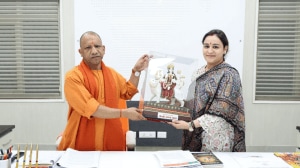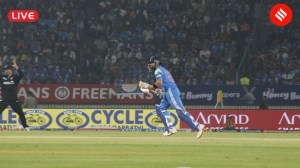In the end, no closure
As Sanjay Dutt is sentenced, a question: has interest in his trial translated into an understanding of the grimmer aspects of the Mumbai blasts case? And, do we have empathy to spare for the riot victims who still wait for justice?

In many ways Mumbai has always been the heart of India. Tatty, frayed and smoggy, it is in its humid embrace that the Indian enterprise of a heterogeneous, equal opportunity society had the best chance of being realised. The 1992-3 riots and the blasts that followed in March 1993 seemed to shatter the first part of that promise: if Hindus and Muslims could not live harmoniously in India8217;s most cosmopolitan city then what chance was there for the secular nation? The long, protracted, journey to justice in both cases, that reached a critical juncture yesterday, has a significant bearing on the second part of the promise: are we an equal society?
The question has hung fire for 14 years since the nightmare that overtook the city. And the direction in which the answer was pointed so far has been far from hopeful. The parameters were of community and class, the first represented by the possibility of justice for the victims of both the anti-minority riots as well as the bomb blasts and the second encapsulated in the fate of Sanjay Dutt. In a sense, both have become intertwined for reasons that have much to do with the peculiarities of our time.
To recapitulate: when the riots occurred in 1992-3, they evoked shock and horror in the city and a determination to prevent a recurrence, evidenced both in the citizens8217; committees that sprang up and the mohallah committees established with a more long term perspective. The setting up of the Srikrishna Commission to look into the causes of the violence was looked upon with hope and the cavalier treatment of its report by the Shiv Sena-BJP government brought citizens out on the streets. The inaction of its political successors has evinced dismay and criticism.
Yet, over time, the riots and the fact that nobody of any consequence was punished for the same seemed to fade into the background while the bomb blasts investigation and trial assumed an almost mythic space in the public mind. To some extent this could be linked to the global scenario. In the post 9/11 world, to be affected by terrorism connoted a certain glamour. To be a victim of terrorism, as Mumbai was to be again in the train blasts last year, was to be on par with the developed world. Riots, in comparison were a somewhat provincial phenomenon.
The other very significant reason why the bomb blasts overtook the riots in the public imagination had to do with Dutt. It is a phenomenon of our media-driven times that the private lives of public figures are presented for observation and discussion in much the same way as their professional acts are.
Amitabh Bachchan8217;s battle for life and Salman Khan8217;s brushes with the law have been imprinted on public consciousness as clearly as their most memorable film roles. But in Dutt8217;s case it was not just a matter of his personal life being on display but the fact that his presence created a disproportionate human interest in the blasts trial.
Images of his family members outside Arthur Road Jail brought home to ordinary citizens the reality of incarceration and separation from loved ones. Familiarity with his family background, the twists and turns of his life and his popularity on screen created an understanding of him as a passionate, easily misled man caught up in circumstances. An awareness of his status brought home the contrasting privations of jail life. Unfortunately that empathy was not extended to others who may have been similarly caught up; instead, the empathy translated into a groundswell of support for Dutt8217;s release alone.
The exaggerated interest in the trial due to Dutt8217;s involvement also did not seem to translate into an understanding of the grimmer aspects of the case: the culpability of public officials such as customs officers who allowed dangerous contraband to be smuggled past their watch, for instance, did not evoke the outrage that one could have expected and, if properly understood, could have led to greater outrage over the culpability of police officials and the administration in the Mumbai riots and in general.
Public sentiment is a dangerous thing, involved more with instant gratification than long term good. Many of the accused in the blasts case have expressed shock at the severity of the sentences passed in the case 8212; the second largest number of death sentences, for instance, in a single trial. But by awarding Dutt a sentence that is in keeping with the tenor of the sentences passed so far, Justice P.D. Kode appears to have demonstrated a consistency that emphasises fairness.
But this is only a job half done. The bomb blasts were a condemnable act and the conspiracy needed to be unraveled and the perpetrators identified and punished. But a full sense of closure could only come about when the riot victims too are given justice.
Shah is a Mumbai-based writer
- 01
- 02
- 03
- 04
- 05































